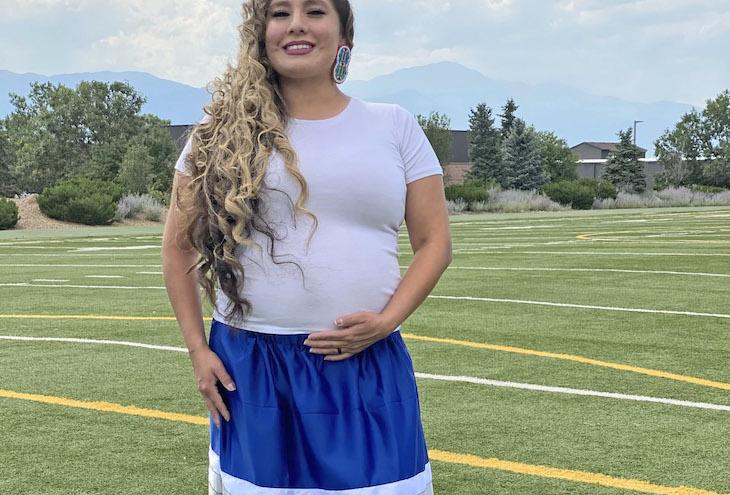One of Frances Dupris’ fondest childhood memories is having chicken pox. No, it wasn’t because the illness was fun. Rather, what she remembers with such nostalgia is that having chicken pox meant that she got to spend an extended period of time with her grandmother, Louise Eagle Tail Quick Bear, and great-grandmother, Rebecca Quick Bear, who took care of her while she was sick.
“When I had chicken pox it was great because we would all have breakfast together and pray together, and I got to listen to my great-grandmother, who spoke only Lakota,” says Dupris, winner of this year’s Blazing Flame Award. “It was such a blessing to have that time.”
By no means was Dupris’ bout with chicken pox the only time her grandmother took care of her. As a newborn, Dupris came down with pneumonia and was in an incubator clinging to life. The sound of her grandmother’s voice reaching her in the incubator remains an indelible first memory. But plenty more memories followed — her grandmother took an active role in her childhood because her parents were young and not entirely equipped to raise Dupris and her sister.
It was a challenging upbringing, one that included periods of homelessness and poverty, but the lessons her grandmother provided were profound. “Ever since I can remember, when she had a home it was open to anybody who needed a place to stay,” says Dupris. “It could be uncles, aunts, and kids, and even people who were not blood-related. She was loving and caring for anybody and everybody.”
Dupris has taken those lessons of service and compassion with her throughout her life and career. Today she is a master sergeant in the U.S. Air Force, a senior non-commissioned officer providing specialized intelligence to support the North American Aerospace Defense Command (NORAD) and the U.S. Northern Command (USNORTHCOM) at Peterson Air Force Base in Colorado. In her nearly 20 years in the military, Dupris has balanced her work and studies, earning both a bachelor’s degree in sociology and a master’s in organizational leadership.
Though her school, job, and family responsibilities — her husband is from the Cheyenne River Sioux Tribe — have always been significant, Dupris’ commitment to sharing, teaching, and celebrating her Lakota and Arapaho heritage has remained a priority. The many examples of her efforts include leading a yearlong series of cultural events through the Air Force’s American Indian and Alaska Native Employee Resource Group, including an event with Billy Mills, the Oglala Sioux athlete who won a gold medal in the 1964 Tokyo Olympic Games in a legendary upset.
In 2019 Dupris coordinated the publication of profiles of Native Americans who achieved the highest enlisted rank in the Air Force. Those stories were distributed to thousands of military and federal employees in a newsletter about the activities of the American Indian and Alaska Native Employee Resource Group. At Peterson Air Force Base, Dupris organized a story hour where she read accounts from S.D. Nelson, a Lakota author and illustrator. For these and other activities, Dupris was awarded the 2019 Diversity and Inclusion Award from the Air Force 93rd Intelligence Squadron and 543rd Intelligence, Surveillance, and Reconnaissance Group. “I do it not because I want recognition but because there is such a small percentage of Natives in the military, I felt it my duty to do it,” she says. “I want to showcase our culture.”
Dupris and her husband also devote countless hours to mentoring and helping Native American and Alaska Native students through the Colorado Springs School District’s Office of Indian Education. Through both this work and her longtime membership in AISES, Dupris helps students navigate school and scholarship applications and tries to foster networking and professional development opportunities.
In other words, Dupris does exactly what her grandmother taught her: she gives back and provides encouragement to those who need it. It’s a message she wants all students to hear, no matter how trying their circumstances may be. “My message is, don’t give up. As humans we go through adversity in life, and as Natives we have more barriers in life than most,” she says. “Know that your ancestors are walking with you. Overcoming adversity is what makes you stronger and more experienced to share with those going through hard times. We are still fighting to have a voice in this world, for our voice to be heard, and for change to happen. You can be that change.”













